- Case-Based Roundtable
- General Dermatology
- Eczema
- Chronic Hand Eczema
- Alopecia
- Aesthetics
- Vitiligo
- COVID-19
- Actinic Keratosis
- Precision Medicine and Biologics
- Rare Disease
- Wound Care
- Rosacea
- Psoriasis
- Psoriatic Arthritis
- Atopic Dermatitis
- Melasma
- NP and PA
- Skin Cancer
- Hidradenitis Suppurativa
- Drug Watch
- Pigmentary Disorders
- Acne
- Pediatric Dermatology
- Practice Management
- Prurigo Nodularis
- Buy-and-Bill
Article
Immunocompromised patients call for special attention to wounds
Author(s):
When a patient suffering from an open wound also presents with a compromised immune system, it can lead to increased complications and additional difficulties in caring for the wound - but it can be done. The keys to successfully healing the wound are "recognition and vigilance."

Key Points
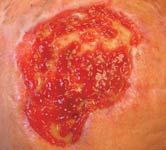
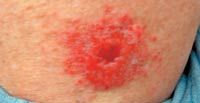
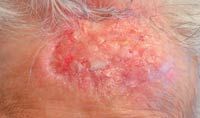
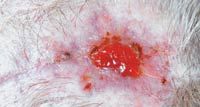
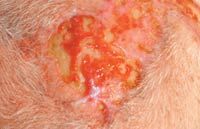
Typical issues
Dr. Brodland outlines some typical issues specific to, or exacerbated by, immunocompromised systems.
"If a patient is taking chemotherapy for a malignancy, blood counts can be so low that patients will lack the white blood cells important to promote healing. That problem is most prevalent at the nadir of the blood count. When that happens, healing mechanisms don't work as well. So we ought to avoid doing surgery on people in their nadir.
"A growing number of patients suffer from immunocompromised systems following organ transplant surgery. Some of their medications can inhibit the healing process. Prednisone is an old standby that slows the rate of healing."
Dr. Brodland says even newer medications appear to be causing the same concerns.
"The reports aren't published yet, but patients using some of the newer immunosuppressive medications are purported to have slower healing or an increased chance of infections, which results in trouble getting wounds to heal."
The dilemma, he explains, is that those medications can't always be avoided.
"You have to be prepared to deal with the healing difficulties, because if you don't use those medications, you may have to select more toxic medications, potentially more deadly. Or, without immunosuppression, the organ would just fail. So, not using the medication is not necessarily an alternative.
"You have to recognize the possibility of impaired healing and be more vigilant with the patient who may be susceptible to a non-healing response,"Dr. Brodland says.
Another patient who may present with trouble healing is the debilitated host. Dr. Brodland says very ill patients can also experience additional problems healing.





